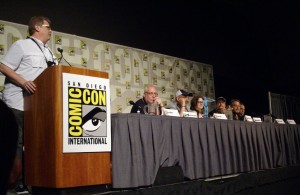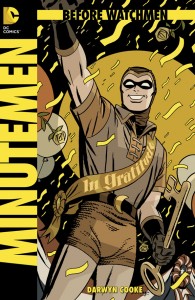“Such sad music. The saddest thing I can imagine…
Ironically, I’d spent the last week editing my book for the sake of my old friends…I gave everyone what they wanted: a sunny remembrance. I realized that carrying all that horror inside me was a small price to pay…
The book was a smash and because it was the only real accounting of our careers, it became the truth…
…’It’ll never be like it was when it was new, but there’s still plenty of life in this old baby.'”
-Hollis Mason, Minutemen #6
Sometimes I wonder what it must be like to work at DC Comics in 2013.
There you are, at one of the inarguable pinnacles of the comic book industry. You’re working for one of the Big Two, making the best page rates available in the American comics industry, working on some of the highest profile books there are. You never have to buy your own drinks at any comic convention in the civilized world, and thousands upon thousands of aspiring creators envy you your day-to-day existence… and yet it is, where the rubber hits the road, a job. You have a boss, and you call him and he or she tells you what you are going to be working on, and you have a choice: you either do it, regardless of how inane or Sisyphean your assigned task is… or you don’t, and hope that you can keep working in your little niche without being singled out and fired.
Put on top of that the particular an individual realities of DC Comics today: you work for a company that, less than 18 months ago, blew up the underpinnings of all their books in the interest of saving them, despite being only a year or so out of Blackest Night, which put more asses in DC Comics’s panels at San Diego Comic-Con than I’d ever seen before. And since that demolition, the company has busily spent its time examining every element of those new books under a microscope, reportedly making last-minute changes and nitpicks every step of the way, causing several high-profile creators to defect to Marvel. Management has mandated new directions and has then apparently fired people when the new directions are seemingly not the right new directions, with boss-favorite creators being given the assignments in the aftermath… and all of it under the daily direction of Bob Harras, the Editor In Chief who was Marvel’s Editor In Chief during the late 1990s. So you’re working under the sure and steady hand of a man committed to raising sales at any cost – and if that cost is cancelling a book, revamping any character, or demanding a crossover, character rape or supporting character murder, so be it… all while in the back of your head, you’re hearing things like, “Clooonnnneeeee Sagaaa…. Chrooooommmiummmm covvverrrrss…”
Now let’s imagine you are one of the creators assigned to the Before Watchmen project: a project that almost no one in comics fandom wanted, if they weren’t actively opposed to it. A project that, by its very existence, implied a comic publisher that was willing to actively and enthusiastically fuck over one of its (former) A-List creators in the interest of making a little money right fucking now, long term consequences be damned. And let’s say you are asked to work on one of these Before Watchmen books while employed by a company where you can see your fellow creators being fired by email, or having their books yanked to make an opening so that one of the Golden Boys can write a book starring fucking Vibe: what do you do?
Well, if you’re Darwyn Cooke, you write a final issue of Minutemen where the narrator makes a terrible mistake, writes the truth about it as best he can while allowing himself to be bullied into severely editing himself for the good of the people around him, and makes the decision to walk away from the whole mess, so that the people foolish enough to follow him can have their chance at things.
I might be – hell, I probably am – reading too much into Minutemen #6, but as a comic book? It could make one hell of a resignation letter.


 Podcast RSS Feed
Podcast RSS Feed iTunes
iTunes Google Play
Google Play Stitcher
Stitcher TuneIn Radio
TuneIn Radio Android
Android Miro Media Player
Miro Media Player Comics Podcast Network
Comics Podcast Network